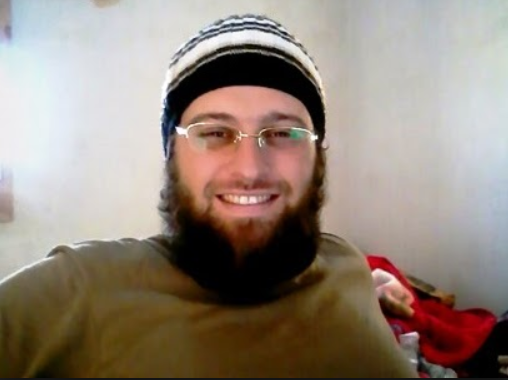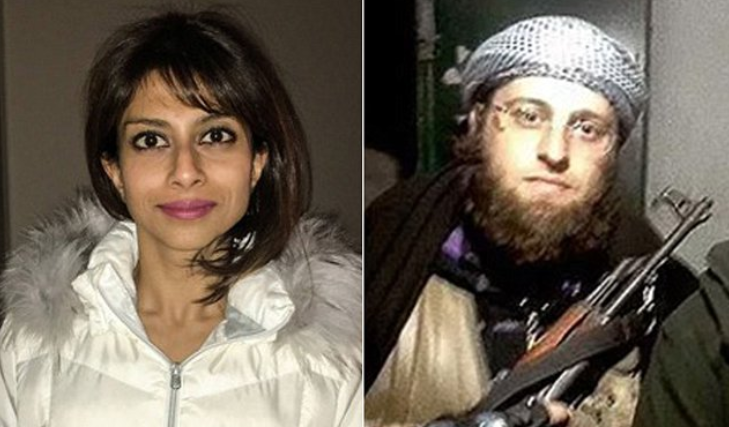
By Todd Bensman, originally published January 21, 2019 in PJ Media
A few years ago, a Texas resident who was born, raised, and educated in my state of Texas — and whose parents, ex-wife, and four children still reside here — reportedly became the chief propagandist for ISIS in Syria. John Thomas Georgelas, son of a prosperous U.S. Air Force doctor, ascended to his senior position because the American military and homeland security establishments regarded that position as so dangerous that hellfire missiles had created the job opening.
But no one has really asked obvious questions since the territorial collapse of ISIS in Syria and Iraq where Georgelas operated, or at least not publicly. Questions such as:
- Where is Georgelas today?
- If he is alive and captured, will we put him on trial like American Taliban fighter John Walker Lindh and document bitter lessons for future generations?
- Will we be told if he is dead?
- If Georgelas is a living international fugitive, what’s being done to track him down? Where is his Most Wanted Terrorist poster, or card in the deck?
I have been scouring open sources for information about him since January 2017, when The Atlantic first broke the story of how Georgelas, a.k.a. “Abu al-Hassan,” converted from Greek Orthodox Christianity and rose to the heights of ISIS leadership. It can be read here. (The family is of Greek heritage and lives in the upscale Dallas exurb of Plano). The mag reported that Georgelas was working as a key contributor to ISIS’s English-language publication Rumiyah, which preaches and teaches death and destruction. He was elevated to ISIS “spokesman” in December 2016, becoming a modern-day Joseph Goebbels of the Islamic death cult. Georgelas has blood on his hands because, as is well-established, ISIS propaganda kills. It is regarded as notoriously effective in recruitment and in justifying murderous acts among ISIS sycophants worldwide.
The Texan should be regarded as one of the world’s most wanted international terrorists right about now. An indication of how important he may be: The position he holds became available in August 2016 when an American drone strike killed the last guy who held it, Abu Muhammad al-Adnani.
There seems to be little doubt that Georgelas is the alleged propagandist; The Atlantic quoted Georgelas’ father acknowledging that his son is “Abu al-Hassan.” British media has corroborated details of The Atlantic piece, and has interviewedpeople who knew his bride in the UK, Tania Joya, who is now his ex-wife and the mother of his four children in Texas.
In the end, Joya and the kids may prove to be the linchpin for solving this mystery. Joya ostensibly was with Georgelas for some months inside Syria, became disillusioned, and moved back to Texas with their four kids. Georgelas reportedly helped her leave, then stayed in touch for several years.

Joya has been living near the grandparents in Plano, has remarried, and interestingly has not been indicted for providing material support to ISIS. That freedom from federal prosecution, and the immigration benefits that allowed her to enter with four kids from ISIS territory, are indicators as to why I presume she has assisted American counterterrorism agencies in ways to which we are not privy.
The 34-year-old has been giving interviews the last couple of years, convincingly (she is no doubt cognizant of her self-interest in doing so) portraying herself as a de-radicalization advocate. She has apparently so completely abdicated from The Cause that she is starting to feel drawn to … Judaism.
What’s missing from just about all of the news coverage of Joya, like this puff piece in Texas Monthly, are any stabs at obvious questions: Is Joya actively assisting the FBI and American intelligence agencies in tracking her husband? Has Georgelas tried to check up on the kiddos, his paternal instinct even momentarily getting the better of self-preservation? Is the FBI watching Joya’s online communications, with or without her knowledge? Or that of the grandparents, who share custody of the kids? Is Joya meeting the requirements of any immigration deal they surely cut with her to induce cooperation?
Finally, a January 2019 Times of Israel feature by David Horowitz got at some of those questions. It reported that Joya remained in touch with Georgelas via Telegram and Skype “for several years after she fled Syria, but that he broke contact after the Atlantic article appeared.
“Everything, all the information I got, I passed it on to the authorities,” she told Horowitz. “That’s what I did voluntarily, because I was very appreciative of the U.S. government for giving me a second chance.”
Horowitz asked Joya what she would say or do if he contacted her.
“We’re divorced. He wouldn’t contact me. I think he’d just contact his mom.”
———————-
Escape without capture or notice would be difficult, though not impossible. The region is a very dangerous place for wandering ISIS fighters and leaders.
Kurdish rebels and Iraqi forces have been capturing thousands of ISIS fighters and their families as the caliphate succumbed to brute military encirclements before and since the October 2017 fall of Raqqa, the putative capital. Others are presumed to be holed up in remnant pockets surrounded by hostile paramilitary forces. A few senior leaders have been caught in intelligence dragnets or killed in airstrikes; others are presumed to have escaped to places farther away while the getting was still good. Some ISIS commanders were recently caught posing as war refugees about to embark on a rickety boat to Greece. The whereabouts of ISIS supreme leader Abu Bakr al-Baghdadi remains unknown.
The Iraqi government is executing hundreds of former fighters after brief judicial proceedings, while Kurdish militias engage in extrajudicial revenge killings as well. Hopefully, the CIA and DIA have systems in place with those forces to filter for the most wanted ones.
It’s doubtful that Georgelas would be among POWs and the Americans not be told about it. Georgelas might have difficulty hiding his identity if captured, because his fingerprints are on record in the United States from a 2006 prosecution. (According to a DOJ press release, Georgelas pleaded guilty to improperly accessing computer data while working for a North Texas internet company. He served 34 months in prison). But that’s only if Kurdish kids running around with guns even bother to think about checking fingerprints.
The deserts and blasted towns of Iraq and Syria are filled with the bones of anonymous dead. Are his among them?
The smart play, and preference, is for Georgelas to be taken alive and brought to trial so that the world can learn why future caliphates must be avoided at all costs. But any word on either the whereabouts of Georgelas or his bones would be vital information.
Follow the author on Twitter: @BensmanTodd